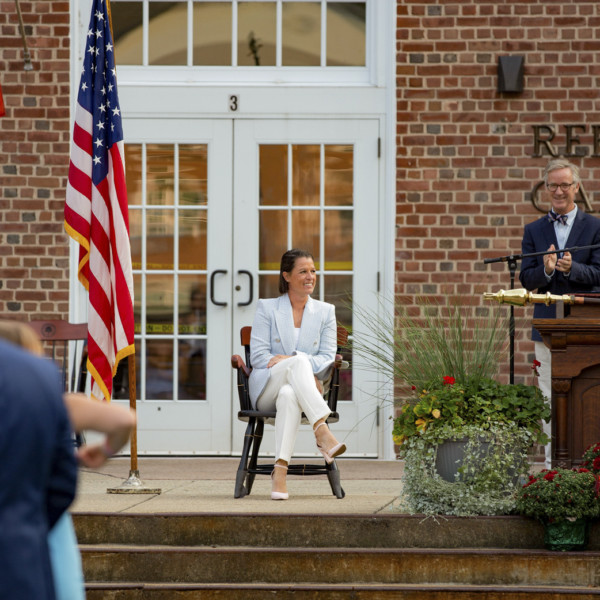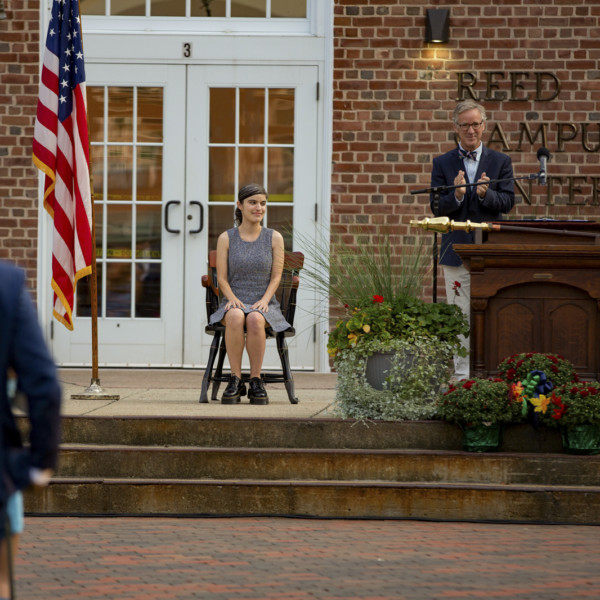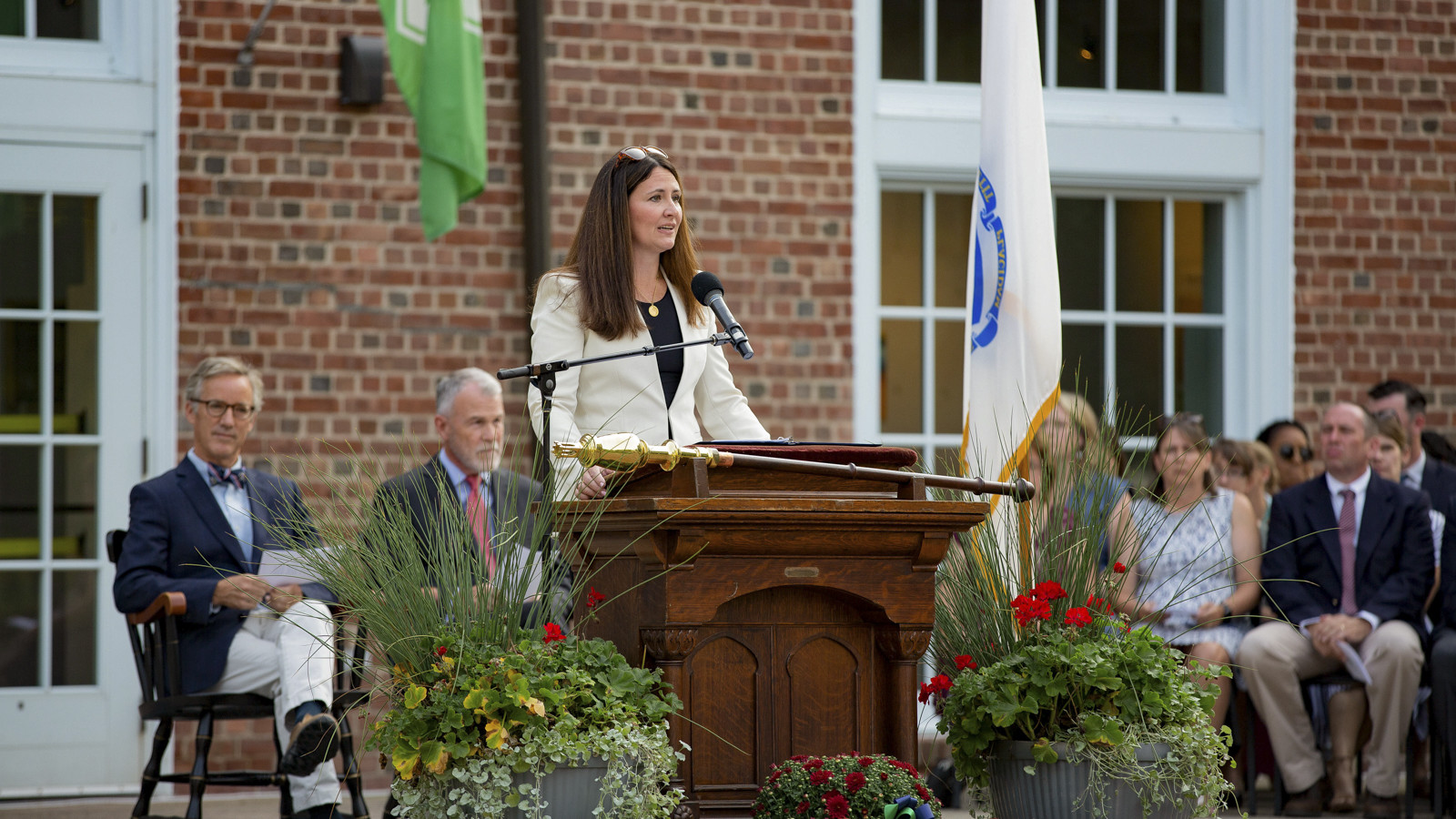At Convocation on Friday, September 9, 2022, Dean of Faculty Corinne Fogg ’99 announced two Faculty Chairs. The recipients are Assistant Dean of Students and Director of Community Life Erin Davey and English teacher Sarah Levine. What follows are her remarks upon these awards.
Moment of Reflection
Good evening, Williston Northampton. I am Ms. Fogg, the Dean of Faculty, and it is my pleasure to welcome you to our 182nd Convocation celebration. It is heartwarming to see students back on campus and gathered here today. Convocation marks the official start to school; it is an annual event where we gather as a community to reflect and celebrate the year ahead.
Poet Naomi Shihab Nye offers perspective on such a start, after a few years of distance, in her poem, “Everday as a wide field, every page”: “And there were so many more poems to read! Countless friends to listen to. We didn’t have to be in the same room— the great modern magic. Everywhere together now. Even scared together now from all points of the globe which lessened it somehow. Hopeful together too, exchanging winks in the dark, the little lights blinking. When your hope shrinks you might feel the hope of someone far away lifting you up. Hope is the thing … Hope was always the thing! What else did we give each other from such distances? Breath of syllables, sing to me from your balcony please! Befriend me in the deep space. When you paused for a poem it could reshape the day you had just been living.” As we gather again, we launch our 182nd year together, we pause and sing, and we participate in many traditions that comprise the long, notable history of the school. As you know, Williston Northampton takes its name from two schools that merged in 1971, Williston Academy and Northampton School for Girls.
The Angelus was presented to Northampton School by the Student Council of 1952. It fast became the heart of the Northampton School for Girls campus. A bell now permanently installed on the lawn of the Residential Quad, the Angelus is inscribed with the words, “For Quiet Thought.” Originally, it was sounded every afternoon as the young women of the Northampton School for Girls, along with their teachers, paused for a minute of silent reflection. Maria Burgee Dwight LeVesconte, of the class of 1952, said at the dedication of the Angelus that it was a call “to remind us of the necessity of thought.” Assuredly, as an institution now rooted in the contemplation and critical consideration of academic thought, and as a community within a world in need of reflection and pause amidst the din, we remain stirred by the tintinnabulation of the Angelus.
As we sound the Angelus now, I invite you to join me in a few moments of quiet thought.
Presentation of Awards
The Granniss Faculty Chair was established in 1999 by Eugenie Granniss, widow of Charles Gardiner Granniss who was a member of the Williston class of 1929. It is awarded to a faculty member who personifies the pure joy of sharing the process of learning.
The process of learning is optimal and ideal when we can take comfort in our surroundings, feel a genuine sense of belonging, and when we are able to delight in the labor. One would be hard-pressed to describe this year’s recipient without using the words pure joy. As I researched and reflected on the lives of both Eugenie and Charles Granniss, the impact of connection, loyalty, and learning emerged. This year’s recipient of the Granniss Faculty Chair is an educator often associated with positivity, light, and levity; delighting in the true happiness that students find at Williston, she has had influence over countless aspects of school life. Commonly correlated with fun, this educator is honored today with an award befitting not only of her capacity for merriment, zeal, and kindness, but also for her true professionalism as an educator.
Arriving at Williston in 2010, as a product of boarding school herself, this faculty member has had immeasurable influence over the student experience in her twelve years at the School. A rare find at the time, I am sure, and even more today, this faculty member is as head’s often describe and long for in their hiring processes, “all-in on boarding school.” Giving voice to students, fostering onus and autonomy, she brought “Why Not Speak Day?” into creation. Her students, past and present, describe this event, and her work to prepare for it, as a truly student-centered day that has fostered visibility and connection for all students, especially those on the margins. Willy Gras simply would not happen without her, and this effort far exceeds the ordering and accounting for inflatables, ice cream, and t-shirts. She is a masterful planner, carefully engineering details of events with students in mind, with an eye for bolstering the brand and aesthetic of the Williston Northampton School. Keenly attuned to what makes students feel joyfully connected to Williston, she has worked in Athletic Administration; has coached lacrosse, soccer, hockey, and softball, elevating the girls’ athletic program by her model of determination; has served as a Dorm Head and Dorm Parent; and has supported the mutable and dynamic needs of the Deans Office and Student Activities. Dean of Students, David Koritkoski shares that Ms. Davey “has been a tireless supporter of Williston students since her arrival on campus. From that first day, she’s been an advocate, friend, and resource who always holds the needs of students paramount.” Wherever she is on campus, and whatever task the school asks her to herald, Ms. Davey “demonstrates purpose, passion, and integrity and is truly the best that Williston has to offer.” She is not simply a joyful and fun educator; she is a woman of professional grit and integrity.
As a classroom teacher, she brings her innate understanding of and compassion for the human condition to her teaching of psychology. She prepares for her teaching thoughtfully, seeking to ensure that each moment of a lesson keeps students engaged in the content. Taking a new faculty member under her wing last year, she supports the work of others, and she endeavors to elevate her colleagues. Sigmund Freud said, “Words have a magical power. They can bring either the greatest happiness or deepest despair; they can transfer knowledge from teacher to student; words enable the orator to sway his audience and dictate its decisions. Words are capable of arousing the strongest emotions and prompting all [human’s] actions.”
Her example, even more than her words, makes it clear that Ms. Davey loves school and relishes time with students – in the classroom, on the fields or ice, in the dorms, and in the small interactions that are oft most impactful for young people. She embodies joy, vulnerability, and resilience in learning; she reinforces for students that hers is a brave classroom where they can ask questions, take risks, and be challenged in new ways. She prompts Williston students, and faculty alike, to joyful action and makes clear that lifelong learning is a process never fully realized as we endeavor to do our best each day.
In recognition of the joy she brings to her teaching and to her students, it is my pleasure to announce that the Granniss Chair recipient is Ms. Erin Davey.

The Richard C. Gregory Faculty Chair was awarded for the first time in the fall of 2012 and is not specific to any particular department. Founded by alumni, this chair serves as an effort to honor Richard C. Gregory, a faculty member whose career spanned 1961-2004. Mr. Gregory had retired from Williston Northampton School in 2004, after teaching History, Music, and English for 43 years. Described as a “giant,” a “Renaissance man,” and a teacher of true excellence, Richard C. Gregory committed his life to Williston and had expansive influence as a teacher and artist. Distinguished past recipients of this chair include Mr. Gregory Tuleja and Mrs. Sarah Klumpp.
This year’s recipient of the Richard C. Gregory Faculty Chair is an unequivocally masterful teacher. In my short time at Williston, I have heard this faculty member’s name used in countless conversations about what it is to create and curate space for student voice in the classroom and about what it is to be a truly proficient educator. Impeccably prepared for each lesson, this faculty member is steeped in knowledge and curates a daily life punctuated by literature – classic and contemporary. Beginning her career at Williston in 2019, she is also a Pushcart Prize nominated poet whose work has appeared in Best New Poets, Green Mountains Review, and Passages North, among other publications. She won the Westchester Review Writers’ Under 30 and won the Barnes and Noble Regional Teacher Contest. Her writing has been described by critics as beating “like a heart,” with “masterful” and “arresting” hold of “rhythm,” “line,” and “language.” In this, she models for her students at Williston what it is to live a vulnerable and rhapsodic life as a writer and learner.
In the classroom, she is a giant of the mind, deftly and graciously moving throughout the room to ensure each student is seen and heard. Serving as a indelible capstone for our students at both ends, she relishes the challenge to teach both seventh grade English and AP English Literature. As a guest in her classroom, I have had the chance to observe her use of a range of pedagogical approaches to create equitable space for each student’s skills, knowledge, voice, and learning style to be amplified. Notably, she employs language that positions her students as experts; she engages in pro-social efforts that foster thoughtful dialogue across difference, careful discernment, critical review, and precise reflection. Peppering her class with non-verbal cues, she can often be found clapping them into collaboration, naturally and rhythmically cueing them for the next learning opportunity. Deftly possessing what Jacob Kouin called “withitness,” she has an unmatched capacity to perceive the needs of her students with accuracy and care, responding to them individually and collectively such that each feels seen, heard, known, and centered.
In conversations over this last year, I have been stirred by the passion that comes forth from within this faculty member. Deeply committed to the craft and the profession of teaching, she volunteered her time and energies to bring mentoring into the fold at Williston this year as an effort to ensure that early-career educators have the supports needed to be successful. Readily willing to discuss what needs to be done to make Williston a richer and more radiant learning environment, she is not afraid to speak truth to power. She does so humbly, with grace, integrity, and inquiry. English Department Chair, Matt Liebowitz, shares that “Ms. Levine is the English Department’s not-so-secret weapon. Her entire approach to the classroom, not just the lessons but also the way she interacts with each student, the patience and trust she affords everyone in her room, and the way she celebrates every victory, puts her students at the center of the experience.” Her gifts in the Writing Center have influenced the words and voices of Williston writers past and present, and she is a mighty model of what it means to be an educator, reader, and writer in 2022.
Of Ms. Levine’s teaching, her students share that “she is by far the most understanding teacher I’ve ever had the pleasure of working with at Williston, in that she understands us as people rather than [simply as] students. Not only does she have real conversations with us if we have a scheduling error or need extra help, but she puts our wellbeing over her own free time.” Ms. Levine is a faculty member who laudably seeks to employ “multiple activities to make class engaging and fun, while also properly preparing us for the AP and for college level classes. She remains transparent about her expectations of us and makes class so enjoyable, it doesn’t seem like work once we’ve earned the trust to do so… and I owe her a debt of gratitude for the academic success I’ve had.”
It gives me great pleasure to present the Richard C. Gregory Faculty Chair to Sarah Levine.


